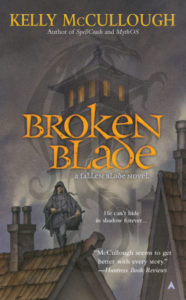Book Review: Broken Blade by Kelly McCullough
A few years back, Aral had it pretty good. He was a Blade of Namara, the goddess of Justice, who meted out her punishment to the powerful wealthy and upper-class people who abused their position and oppressed those below them. He even had a cool moniker, Aral Kingslayer, after his most famous judgement. But then the other gods turned on Namara, killing her, and her followers were outlawed.
Now the Blades are dead or hiding. Aral returned his magic swords from whence they came, and must hide his connection to the shadow creature Triss since it’s a dead giveaway to his former career. Aral is a “shadow jack” now, smuggling and stealing on contract, and between jobs he drinks a lot. When we meet him, Aral has a new client. One that’s clearly wearing someone else’s clothing–but then a jack’s clients always lie about something.
The client claims she wants Aral to deliver a message in the dead of night. When he attempts to do so, Aral discovers that his old colleague Devin is not, as reported, dead, but alive and working for the enemy. Turns out the message was for Aral!
Now Aral and Triss must stay alive against a foe that knows all their strengths and weaknesses, as well as a hostile government and other criminals, and accomplish the real mission their client had in mind.
This is the first in the “Fallen Blade” series of fantasy novels. Mr. McCullough is also known for his popular “WebMage” series.
Broken Blade is very much in the “hardboiled detective” tradition of lying clients, corrupt officials and violent action. Not much mystery, but there are secrets here, not all of which are uncovered in this volume. Especially left unanswered are the real motives behind the death of Namara–it’s no secret who killed her, or his stated motives, but they don’t add up.
The good: I liked that it was established that Aral was not the best Blade ever, though he was top of the field for a time, and that there are other surviving Blades who had not (when last seen) betrayed their principles. Aral is working without some of his best tools, such as the magic swords and the performance-enhancing drug the Blades were addicted to (it’s made obvious that the drinking is just substituting one addiction for another) and his resources steadily dwindle during the course of the story.
The magic system is interesting, if inherently unbalanced. Pick the wrong bond-creature, and you’re stuck with minimal powers to work with.
Aral and Triss make a good pair of personalities to move the characterization along.
Less good: There’s an extended flashback set-piece to establish how Aral got the name “Kingslayer.” While exciting in itself, it kind of kills the momentum of the main story for a bit.
Also, I found the plot a little forgettable; during the writing of this review I had to go back several times to remember which events happened when.
Content note: Aral is tortured at one point.
Overall, a competently written book that should be of interest to fans of the author, and of hard-boiled fantasy protagonists.

